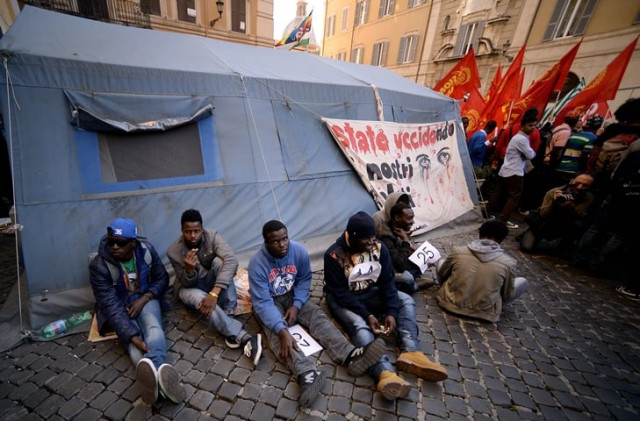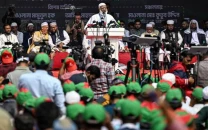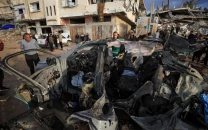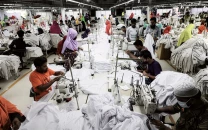EU under pressure as horror of migrant disaster emerges
Activists gather in front of Italian parliament, ask for humanitarian commitment in wake of migrant boat disaster

Demonstrators holding numbers symbolizing the dead migrants sit during a demonstration in front of the italian parliament in Rome's Montecitorio Square on April 21, 2015. PHOTO: AFP
With the crisis set to be discussed at an emergency summit on Thursday, allegations of callous disregard for Arab and African lives are pushing EU leaders to respond to a disaster in which 800 people are feared to have died in appalling circumstances off the coast of Libya on Sunday.
The vast majority of those on board were locked in the hold or the middle deck of the 20-metre (66-foot) boat when it capsized following a collision with a Portuguese cargo ship responding to its distress signal.
Only 28, including two crew members who have been arrested, survived and 24 bodies have been recovered.
A Bangladeshi teenager who was among the survivors revealed there had been three classes of passengers on board the perilously overcrowded vessel.
"Those who had the least money were stuffed into the hold at the bottom, and locked inside," the teen, identified by his first name Abdirizzak, told Corriere della Sera.
"We were on the middle level and only those who paid more were above."
When the first collision happened in pitch darkness, scenes of pure terror ensued, he said.
"Everyone was screaming, pushing, punching, elbowing -- terrified. From below we could hear those who were locked in shouting 'Help, Help!'
"I don't know how but somehow we managed to swim outside just in time before the boat went down."
Another Bangladeshi survivor told Britain's Daily Telegraph the migrant boat had hit the Portuguese container ship three times.
"People panicked -- they all ran to the other side of the deck. That's what tipped us over," 17-year-old Riajul was quoted as saying.
"Most of the other migrants were African and they didn't know how to swim. I did and that's why I survived."
Prosecutors in the Sicilian city of Catania said Tuesday they believed the boat's Tunisian captain was responsible for steering mistakes and the reckless overcrowding which led to disaster.
Mohammed Ali Malek, 27, will appear before a judge on Friday along with crew member and Syrian national Mahmud Bikhit, 25, who was also arrested following the catastrophe.
Most of the survivors and the victims appear to have been young men but the exact breakdown of the human cargo may never be known as the wreck has sunk in one of the deepest parts of the Mediterranean.
The UN Security Council called overnight for a strengthened global response to migration and human trafficking, and the 15-member council voiced support for southern European countries struggling with the refugee influx.
After a one-minute silence in parliament in memory of the victims, Italian Prime Minister Matteo Renzi called on his country's European partners to help stabilise the countries sending the flood of migrants into lawless Libya and onto boats for Europe.
"Fighting people trafficking means fighting the slave traders of the 21st century. It is not only a question of security and terrorism -- it is about human dignity," Renzi told deputies.
European Commission president Jean-Claude Juncker said Italy and other southern European countries in the frontline of the crisis needed more financial support.
Austrian Chancellor Werner Faymann said the EU should be looking at building massive refugee camps in North Africa to shelter would-be migrants and refugees.
British Prime Minister David Cameron is ready to offer the services of a Royal Navy warship for rescue efforts, according to a report in The Times.
EU governments have already agreed to double the resources available to a maritime border patrol mission, but that has been attacked as too little, too late by refugee and rights groups.
Sunday's disaster was the worst in a series of migrant shipwrecks that have claimed more than 1,750 lives this year -- 30 times higher than the same period in 2014 -- and nearly 5,000 since the start of last year.
If current trends continue, there could be 30,000 deaths at sea this year and Italy will have to process 200,000 migrants landing on its soil, according to projections by aid workers.
Italian officials believe there could be up to one million refugees from Syria, Eritrea and sub-Saharan Africa already in Libya hoping to board boats.
Australia has urged the EU to follow its example and send naval boats to turn the traffickers back.
EU leaders will on Thursday discuss ideas including trying to capture or destroy people-smuggling boats and a pilot scheme for the fast-track return of migrants to their home countries.



















COMMENTS
Comments are moderated and generally will be posted if they are on-topic and not abusive.
For more information, please see our Comments FAQ